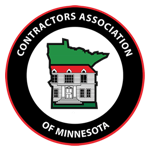| Good Morning:
I wanted to send out an update to explain some recent legislative changes. It was a very busy session with a lot of bills passed affecting the construction industry. Additionally, we’re seeing some changes in the world of insurance restoration I wanted to address as well. These are all pretty important, but if you’re too busy today to read it all today, scroll to the bottom for a quick summary.
Legislative Changes
- Legalized Cannabis. Effective August 1, recreational cannabis is legal in Minnesota. You can prohibit its use during the workday, but cannot discriminate against employees who use it off duty. There are several exceptions to this rule for those positions such as those that deal with federally funded projects or require a CDL.
- What you need to do? Create a policy prohibiting cannabis use during working hours and/or add that to your handbook.
- Non-Competes are Illegal. Effective July 1, non-competes are no longer legal in Minnesota except in certain business sales. All non-competes entered before July 1 remain effective. Non-solicits and trade secret protections are still legal.
- What you need to do? Amend your employment or independent contractor agreements to remove non-competes going forward.
- Earned Sick and Safe Leave. Effective January 1, 2024, all employees are entitled to 1 hour of earned sick and safe leave for every 30 hours worked to 1) care for the employee’s own or family member’s mental and physical health; 2) deal with domestic abuse, sexual assault, or stalking of employee or family member; 3) weather or public emergency; 4) inability to work or telework because of health concerns related to transmission of a communicable illness; and 5) determination by a health professional that employee or family member working would jeopardize the health of others.
- What you need to do? Amend your leave policy by new year.
- Paid Family and Medical Leave. Effective January 1, 2026 the state will establish and fund a paid family and medical leave program for certain family and medical leave reasons. It will operate similar to unemployment and be funded through a payroll tax increase. Eligible employees will be able to take up to 12 weeks of partial wage replacement for health and pregnancy. Employers that offer private benefits that meet or exceed the requirements can apply for approval to opt out of the state plan.
- What you need to do? Nothing today, but you will need to revisit your benefit plan to determine whether it meets or exceeds the state’s.
- Accommodations for Nursing Mothers, Lactating Employees, and Pregnancy. Increases protections for pregnancy accommodations to allow an employee to take more frequent and longer restroom, food, and water breaks as an accommodation without being required to provide supporting documentation.
- What you need to do? Offer reasonable accommodations and breaks in these instances. Amend your policy accordingly.
- Human Rights Act Expanded. The CROWN Act broadens definition of “race” under the MN Human Rights Act to include “hair texture and hair styles such as braids, locs, and twists” as an impermissible basis for discrimination.
- What you need to do? Nothing. Presumably, you are not discriminating based on someone’s chosen hair style. If you are, then stop it.
- Wage Protection for Construction Workers. Effective August 1, 2023, general contractors and subcontractors are required to assume liability for unpaid wages and benefits owed to a claimant by a subcontractor at any tier acting under the general contractor or subcontractor. There is an exception for work performed on a home improvement contract for a 1-2 family dwelling.
- What you need to do? Update your subcontractor agreements and your document collection practices to ensure your subs are paying their subs and sub-subs.
Insurance Restoration Issues
- Timeline for Claims. Most Minnesota policies traditionally have a 2-year limitation to take legal action in the event a claim is in dispute in line with Minnesota’s “standard fire policy.” However, Minnesota also has a “standard hail policy” which allows for a shorter 1-year limitation period. Many carriers are now categorizing parts of their policies as “hail” and applying the shorter 1-year limitation period to hail claims.
- What you need to do? Be aware the old “standard” 2-year limit is more likely to be a 1-year limit after the date of the storm. Assume all claims have a one-year deadline.
- Code Coverage after St. Matthews. This is a long topic – see the blog here.
- What you need to do? Focus on repairability of systems like the roof assembly or wall assembly.
Quick Summary
Too long, didn’t read?
- Cannabis is legal. Get a no cannabis in the workplace policy.
- Non-competes are illegal. Remove them from your employment agreements.
- Employees are entitled to get safe and sick leave starting January 1. Amend your time-off policy.
- Paid family medical leave starts in 2026 and it will function like unemployment. Opt-out of the state plan if you meet or exceed the requirements.
- Increased accommodations for nursing, pregnant, and lactating mothers. Amend your policy.
- It is illegal to discriminate based on someone’s hairstyle.
- You may now be responsible for paying your subcontractor’s payroll if they don’t. Amend your subcontractor agreements.
- Claim deadlines are beginning to shift from 2 year to 1 year from the date of loss on hail claims.
- Code required repairs should be focused on the system at issue rather than individual components.
Revisions should be made to your company’s (1) employee handbook; (2) subcontractor agreements; and (3) employment agreements. If you need your employment agreements and policies revised, please reach out and we can get that handled. Forgive me for the lengthy email – it was a legislative session like none I’ve ever seen.
Disclaimer: This e-mail does not constitute legal advice, but rather is intended for informational purposes only. You should contact a lawyer (hopefully us) to review the impact of this information on your business. |


